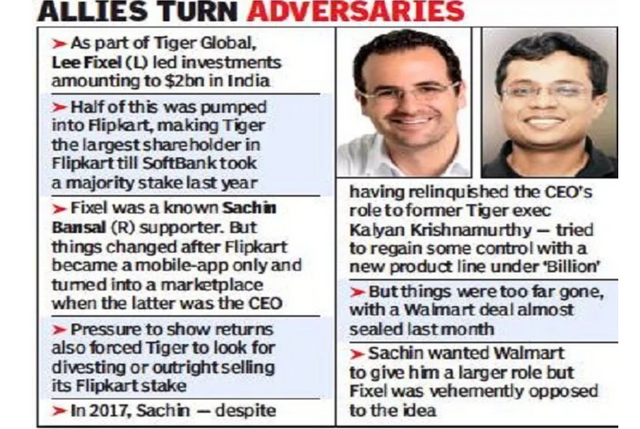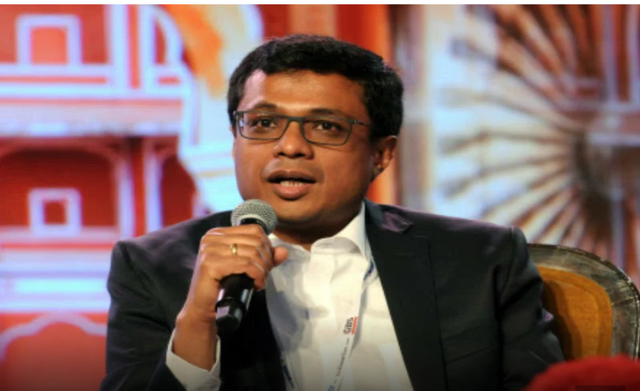What led to Sachin Bansal's exit from Flipkart???
Tiger Global’s Lee Fixel and Flipkart’s co-founder and CEO of nine years Sachin Bansal enjoyed a very special investor-founder relationship. Ever since the New York-based fund manager spotted the unrelated duo of Sachin and Binny Bansal in 2009 — two years after they founded an online bookstore in Bengaluru — it was a partnership that seemed poised to go down in the nascent history of India’s consumer internet industry. Fledgling tech startups, globally, which have gone on to become big, always boast of an anchor investor, someone who believed in the scrappy upstart in its very early days. Think Peter Thiel at Facebook or SoftBank’s Masayoshi Son at Alibaba.
We wrote in our May 10 edition — after Walmart bought a 77% stake in Flipkart, valuing it at $21billion — how Tiger and Fixel emerged as the online retailer’s champion investor, and its operator through its executive who’s currently the e-tailer’s CEO Kalyan Krishnamurthy, and the one who brokered the Walmart deal.
Relationship started to turn by 2015
This coincided with a rocky year at the e-retailer and also at the investment fund, which manages more than $25 billion in assets. Under the CEO-ship of Sachin, Flipkart’s strategy of going mobile-app only, turning into a marketplace model instead of being inventory-led, and letting product take precedence over business grossly misfired. The first signs of a chasm started to develop between the two from here on.
A person close to the Flipkart story says, “The irony of the situation is that when Sachin decided to leave and sell his entire shareholding to Walmart because he was not able to get a larger role and special rights for founders and minority shareholders, it was Fixel who led the camp that pushed for his ouster. From being biggest supporter, he had by now turned totally against Sachin.” Few years ago, the same person had told this reporter, how Fixel used to treat Sachin with “kid gloves”.

So what changed?
Tiger under the cosh to deliver on Flipkart
Founded by Chase Coleman in 2001, Tiger started off primarily as a Wall Street hedge fund, but went on to build an impressive private market portfolio of hot internet and tech companies across the US, China and India. The fund established a beachhead here in 2007, when it bet on Just Dial and MakeMyTrip.
Its India operations, started by Feroz Dewan, were taken into top gear by Fixel. The 38-year-old became an India bull after seeing the China ecommerce market play out. Just the time he took a wager on Flipkart, Tiger had bet on JD.com, which IPOed at a $25-billion valuation in 2014. Having invested $2 billion in India, with half of that capital ploughed into Flipkart, Tiger was the web retailer’s largest and most influential shareholder till SoftBank came in last year, and took majority ownership by partly buying the fund’s shares.
Read also: How to handle the exit of a co-founder at a startup
Across 2014-15, Fixel began backing startups in series-A rounds at dizzying valuations. While the euphoria lasted for a couple of years, Fixel’s position at Tiger started to look shaky after the funding boom came to an end in mid-2015.
“Dewan was not in line with Fixel’s big bets in India, especially the outsize capital that had gone into Flipkart. This was the time Tiger had led consecutive financing rounds in the online retailer and had marked up its valuation to $15 billion,” says a person in the know. Things came to a head between Dewan and Fixel in 2015, as Tiger went through an internal churn. In May that year, Dewan left the fund, where he was managing $6 billion of the public market portfolio. Scott Shleifer took over from him. Fixel was made the sole head of the firm’s private equity portfolio.
In mid-2016, Shleifer came down to India and met with the top management at Flipkart, a person who was present at the meeting recalls. “Shleifer’s meeting seemed interrogative. Till now, no one other than Fixel had interfaced with Flipkart’s management, so it signalled a big change,” the person says.
Did Tiger become a seller in India?
An investor, who did not want to be named, says, “Fixel has very strong opinions on certain issues. And if the founder has strong opinions, too, which are on the opposite end, then they clash.” This is what played out between the Flipkart investor and the company’s co-founder and its longest serving CEO.
Sachin’s strained equation with Fixel’s aide Krishnamurthy, who made a return to Flipkart after two years in 2016, added to his deteriorating relationship with his biggest backer. People briefed on the developments say Tiger was under pressure to show returns from its huge India bet. The fund stopped making new investments by the end of 2015. Fixel’s visits to India became infrequent, and in 2016 he became disengaged with his portfolio companies, and Tiger actively started scouting for strategic investors for Flipkart.
Flipkart board rallied against Sachin
Another person familiar with the goings-on says, “After the missteps of 2015, Flipkart’s board gave a chance to Binny to helm the company. But another year down, Tiger wanted to pass on the baton to a strategic. Fixel and Sachin Bansal went to eBay, PayPal, Microsoft, and Tencent, discussing a potential investment.” In March 2016, they both first engaged with Walmart.
While Sachin continued in a non-operating role, he tried to claw back in 2017, after Krishnamurthy took over as CEO, by introducing a line of private label under ‘Billion’ and launching an artificial intelligence unit. By then, Flipkart had gone back to its successful formula of racking up mobile phone sales and driving up gross merchandise value (GMV) growth, as it fought an aggressive Amazon. And it fared well under the new leadership of Krishnamurthy, who was shaping a turnaround at Flipkart.
People in the know say Sachin was of the view that the e-tailer had stopped investing for the long term and was focusing on simply shoring up growth through sale events. “Even as he tried to make a return, the talks with Walmart started to get serious in 2017. Now, Sachin wanted Walmart to agree to give him a larger role, as the new investor and acquirer, but Fixel was vehemently opposed to the idea and the entire board rallied behind him along with Binny. Walmart went with the board, which led to Sachin quitting and selling his stake fully,” says a person privy to the talks. Sachin was asking for preferential ‘founder rights’, a little too late in the day, in order to win back from Tiger control of the company he co-founded. Other founders sensed it early on, like Ola’s Bhavish Aggarwal, who blocked a secondary deal when Tiger Global was selling its shares to SoftBank, as we first reported in our April 25 edition. Thanks to the favourable rights due to the changes made in the article of association, Aggarwal could scupper the transaction.
Cut to April 2018: The Walmart deal was almost sealed, despite Amazon making an offer of $22.5 billion, which was supported by SoftBank and Sachin. The rest of the shareholders were skittish about an Amazon and Flipkart alliance. “Besides the competition control lens, it would have taken much longer to close a deal with Amazon. Also, the demands laid out by Sachin were likely to delay the transaction or may be even jeopardise the sale. Seeing this, Fixel got Binny on board, and convinced him to steer the deal in the last few weeks,” says another person privy to the matter.
Fixel remains on the Flipkart board with a 4-5% stake, and Binny stays on as the group CEO in addition to taking on Sachin’s executive chairman title. A Tiger spokesperson said, “Neither Fixel nor Tiger Global will have any comments on leadership changes at Flipkart and/or Lee’s personal relationship with Sachin or Binny Bansal.”
